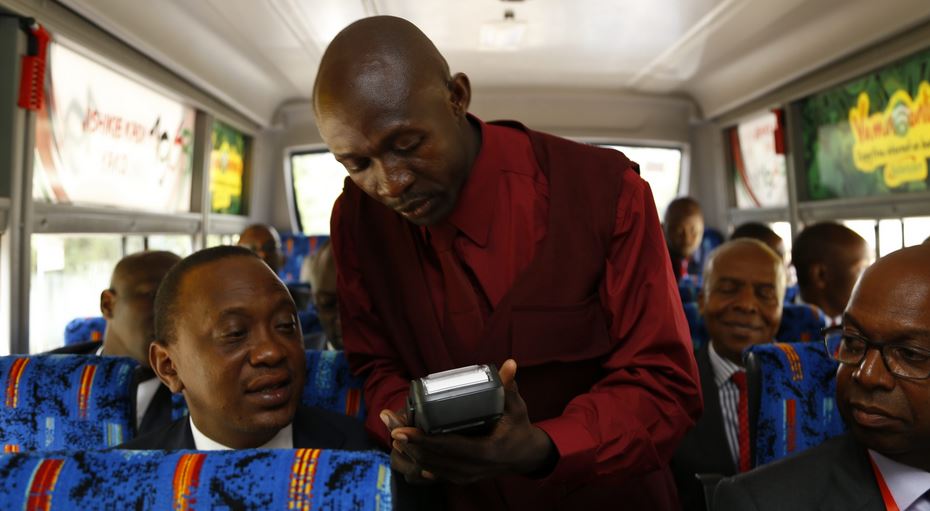News
Why The State Is Moving To Impose Total Ban On Cash Use In Matatus

Use of cash in public transport services is likely to be banned once the government approves a digital fare collection system that will also have the technical capability to contact trace passengers in the fight against the novel coronavirus disease.
The National Transport and Safety Authority (NTSA) has advertised for bids inviting tech companies to install mobile software and web applications for the nearly 2 00,000 matatus in the country. Once the system is in place, all passengers could be required to pay their fares via mobile money platforms, giving the government access to their identities and personal contact information that is needed to combat the Covid-19 pandemic, which has disrupted lives worldwide.
NTSA Director-General George Njao said through a tender notice the authority plans to introduce the mandatory use of cashless payments for all Public Service Vehicles (PSVs)”.
“The cashless system will also provide a platform for development of an effective contact tracing application to support the government effort in addressing the coronavirus pandemic.”
Contact tracing, a disease control method that traditionally relies on patients’ memories of their movements, identifies people they might have infected so they too can be isolated either for monitoring or treatment.
Firms are expected to submit their bids before June 16, an indication of the State agency’s plan to roll out the cashless payment platform. That means companies have two weeks to submit their bids.
An earlier cashless fare payment platform fronted by the government, and which was launched in November 2014, flopped following strong opposition from matatu operators who felt that it was a ploy to monitor their daily earnings for taxation measures. The digital payment system required passengers to get pre-paid cards or use mobile money for payment of fares in PSVs.
At the time, the stated interest of the government was to eliminate criminal cartels that had infiltrated the PSV industry and to provide the taxman with a platform to track incomes in a sector that grosses more than Sh420 billion annually.
The digital fare collection system was expected to curb employee fraud by matatu crew because it would have allowed owners to track payments in real time. The money collected was to be remitted in a bank account, making it easier for vehicle owners to access loans.
Technology firms and banks had come up with products to support the PSV e-ticketing system with their eyes on the one percent processing fee, currently estimated at Sh4 billion annually. The firms included Safaricom, which declared a “partnership” interest in My 1963 commuter card with Mwakio Ngale, a Nairobi-based techie through his IT firm Fibre Space Ltd.
Now, another pressing need for the cashless payment platform has emerged in the form of contact-tracing amid the Covid-19 pandemic.
Should it be implement, the platform is expected to ease the monitoring of infections where people who unknowingly come in contact with Coronavirus disease patients, making it possible for them to be immediately traced and isolated for treatment or monitoring.
Currently, the government uses oral information provided by patients during the tests to track those who turn positive, something that has been blamed for the growing number of patients outside isolation facilities. Using apps to accelerate contact tracing, in which authorities identify and test people who were recently near a virus carrier, has emerged as a tool to stem new infections.
It could help authorities test more potentially infected individuals than they would normally be able to based on patients merely recalling recent interactions from memory.
Technologists and health officials around the world are racing to develop smartphone apps to trace who has been in contact with carriers of the infectious virus.
“Interested applicants who may wish to register as service providers for the provision of contact tracing (passenger manifest) with a payment gateway service must submit their proposals on or before June 16,” Mr Njao said in an announcement published yesterday.
Other cashless payment service platforms that have been tried in the past include BebaPay (run by Equity and Google), Abiria (Kenya Bus Service), Pepea, Tangaza Pesa PSV card and Co-op Bank’s M-Nauli.
Safaricom has also assigned M-Pesa paybill numbers to willing matatu operators in a service it called Lipa Fare na M-Pesa where travellers do not incur any transaction charges and matatu owners pay a one per cent commission based on the value of total fares collected through the mobile platform.-Business Daily.
Kenya Insights allows guest blogging, if you want to be published on Kenya’s most authoritative and accurate blog, have an expose, news TIPS, story angles, human interest stories, drop us an email on [email protected] or via Telegram
-

 Grapevine1 week ago
Grapevine1 week agoAlleged Male Lover Claims His Life Is in Danger, Leaks Screenshots and Private Videos Linking SportPesa CEO Ronald Karauri
-

 Lifestyle2 weeks ago
Lifestyle2 weeks agoThe General’s Fall: From Barracks To Bankruptcy As Illness Ravages Karangi’s Memory And Empire
-

 Grapevine4 days ago
Grapevine4 days agoRussian Man’s Secret Sex Recordings Ignite Fury as Questions Mount Over Consent and Easy Pick-Ups in Nairobi
-

 Investigations2 weeks ago
Investigations2 weeks agoEpstein Files: Sultan bin Sulayem Bragged on His Closeness to President Uhuru Then His Firm DP World Controversially Won Port Construction in Kenya, Tanzania
-

 Investigations1 day ago
Investigations1 day agoMulti-Million Dollar Fraud: Three Kenyans Face US Extradition in Massive Cybercrime Conspiracy
-

 Investigations1 week ago
Investigations1 week agoEpstein’s Girlfriend Ghislaine Maxwell Frequently Visited Kenya As Files Reveal Local Secret Links With The Underage Sex Trafficking Ring
-

 News2 weeks ago
News2 weeks agoState Agency Exposes Five Top Names Linked To Poor Building Approvals In Nairobi, Recommends Dismissal After City Hall Probe
-

 Business1 week ago
Business1 week agoM-Gas Pursues Carbon Credit Billions as Koko Networks Wreckage Exposes Market’s Dark Underbelly
















